How and with what to wash vegetables and fruits?
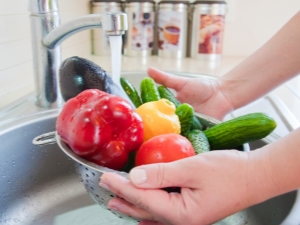
To prepare almost any dish or dessert, we need vegetables and fruits. Before you start cooking, the fruits should be thoroughly washed. This is especially true for those fruits and vegetables that we eat with the peel. How to wash them properly and, most importantly, with what? Answers to all questions in our special material.
General recommendations
Any fruits and vegetables, even if they are from your garden and garden, must be thoroughly washed before use. This is necessary in order to rid the fruits of dirt, dust, microbes and residues of various chemicals that process fruits and vegetables during the growing process. If the products are poorly washed, then there is a high probability that harmful microorganisms will get into the food, and then into your intestines, which can lead to very disastrous consequences.
There are several rules that will help you properly wash vegetables and fruits. In the event that the vegetables were grown in your own garden, and you know for sure that no harmful substances were used during cultivation, then it will be enough just to rinse them under cool running water. But if these are purchased fruits and they contain various pesticides, they were treated with wax and other means, then a special tool for washing vegetables and fruits is needed here.
Bought fruits and vegetables, the quality of which you are not very sure of, first of all, you need to wash off the wax. This can be done by any means, which we will discuss below, and in this case, you can use a special soft brush to help remove wax or other substance.
It is important to mention here that you should have a separate brush in your kitchen for washing vegetables and fruits, which you will not use anywhere else.
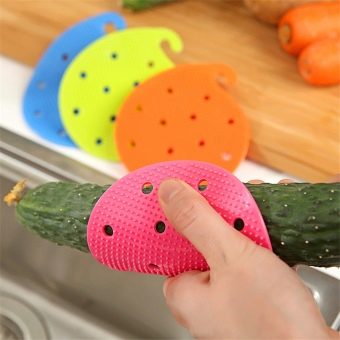
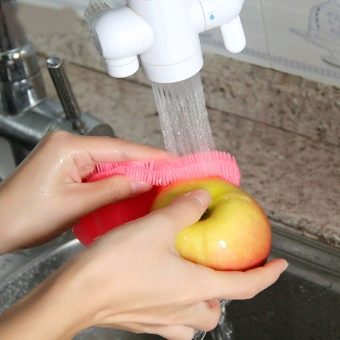
Before you start washing fruits or vegetables for children, the product should be soaked in cold water for a while. Just enough water is needed to completely cover the fruit. This will get rid of various harmful substances and then they can be easily washed before use. It is worth noting that it is necessary to soak and wash the fruits only in a limited amount. Wash as many pieces of vegetables or fruits as you need at the moment. It is not worth washing the fruits for the future, as they will quickly deteriorate.
Vegetables should be cleaned of dirt before washing. This can be done under running water, using a regular brush. If you need to wash the cauliflower, then it is first divided into inflorescences. Root crops are simply cleaned of dirt, pre-soaked in warm and then in cool water. Cucumbers, tomatoes should be soaked exclusively in cool water. It is better to scald citrus fruits with boiling water first, and then start washing. Melon, watermelon or pumpkin do not need to be washed first. Apples, pears, grapes, plums and peaches are best pre-soaked in cool water.
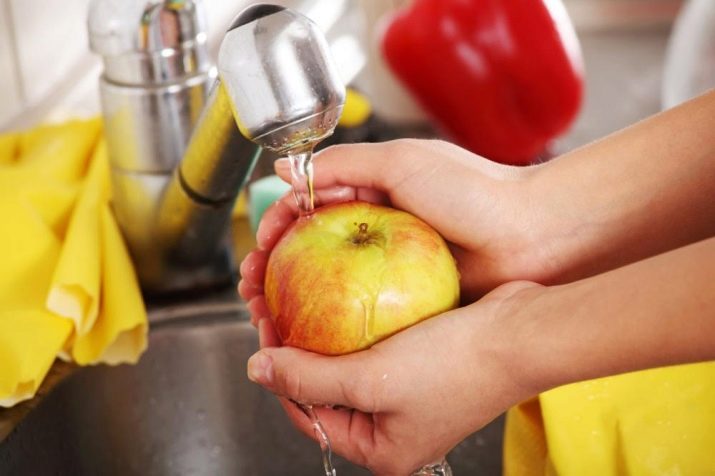
The best folk remedies
Many housewives advise using the most common soap or gel that is designed for washing dishes to wash fruits. We do not recommend using such products, since they contain chemicals, the remains of which can penetrate the body and provoke severe poisoning. You can not even use washing or baby soap, as many do.All the same, the particles of substances contained in the soap remain on the peel, it is very difficult to completely remove them.
The best tool that every kitchen has is lemon juice and the most common baking soda. In such a tandem, products are often used to clean any surfaces in the kitchen, since soda in combination with citrus fruit juice perfectly eliminates grease stains. This tool will also perfectly clean the skin of fruits and vegetables, ridding them of harmful bacteria and more. And most importantly, this tool is completely safe for the body of any person.
To prepare it, you will need a glass of plain water and one tablespoon of tea soda and lemon juice. We mix everything thoroughly and get a ready-made product for washing fruits. To make it easier to use, we recommend placing it in a clean spray bottle. Shake well before each use.
It is best to store this mixture in the refrigerator. It is very easy to use. Rinse any fruit with water, then spray our product and leave it like that for a couple of minutes. Rinse thoroughly, using a brush if necessary.
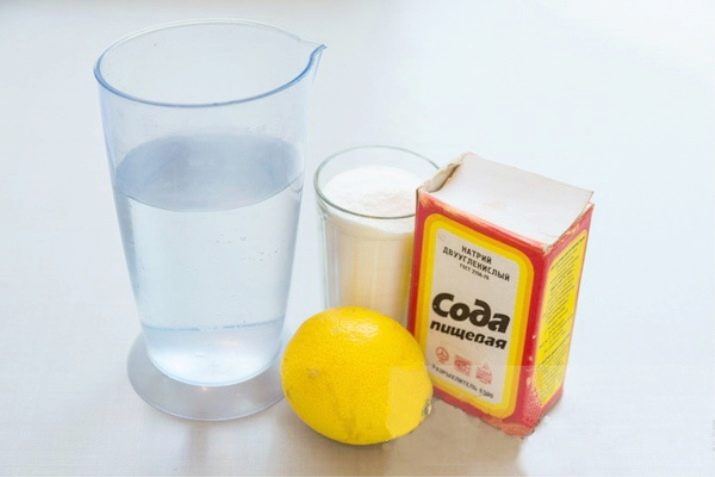
The most common table vinegar will also help in this difficult matter. When choosing vinegar, pay attention to the fact that it should not be a concentrate. You should use a maximum of twelve percent vinegar, which can be eaten immediately. We dilute it in equal proportions with purified water. In the resulting solution, you can safely wash your favorite fruits. Then rinse them with running cold water. Vinegar easily rids fruits of various plaque, microbes, dirt and other harmful substances.
If there is no soda or vinegar in the house, then the most common salt is quite suitable. In order for it to help thoroughly wash the fruits, a solution should be made from it. For one liter of warm water, you will need exactly four large spoons of any salt. As soon as the salt crystals are completely dissolved, you can safely wash vegetables or fruits in this solution. After that, do not forget to rinse them with clean water and only then they can be consumed.
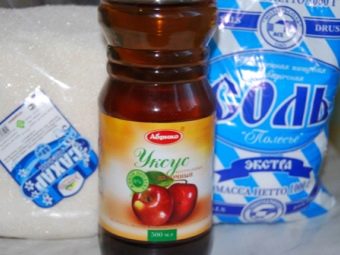
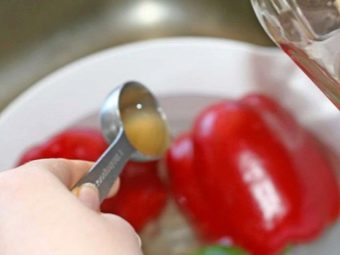
In order not only to clean the fruit of dirt, dust and wax, but also to disinfect it, you can treat it with hydrogen peroxide. For a liter of warm water, you need only one large spoonful of this product. Mix everything thoroughly and wash vegetables or fruits with the resulting liquid.
Store rating
Oddly enough, it sounds, but today in almost any store you can find a special tool for washing vegetables and fruits. Now you can find a Japanese, Korean or even English remedy that is made from safe ingredients and does an excellent job.
- One of the popular remedies that receives positive reviews is Kyukyuto. The tool perfectly copes with wax, removes various contaminants, has an antibacterial effect and does not leave a feeling of “stickiness” on the fruit at all. As part of this Japanese remedy, there are no chemicals, only plant and mineral substances.
- Bentley Organic - a wonderful product from manufacturers from the UK, which contains natural acids. The tool perfectly eliminates dirt and germs. In addition, it is well washed off the peel of the fruit and does not leave any odors.
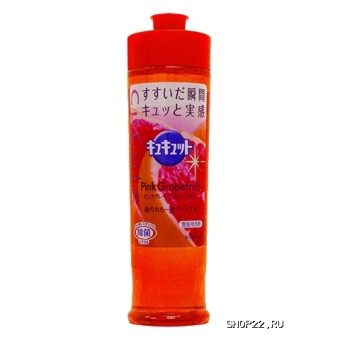
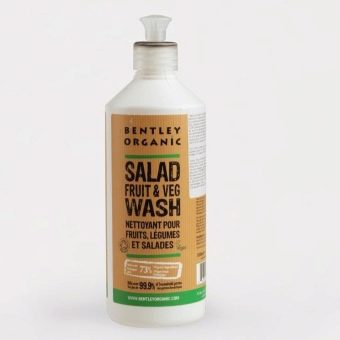
- Mako Clean - detergent for fruits and vegetables from Israeli manufacturers. The product is available in a convenient bottle with a spray nozzle, it is easy to spray, so you can even take it with you.The product contains only natural ingredients, including aloe vera juice and various food acids. After washing, it does not leave any odors and one hundred percent does its job.
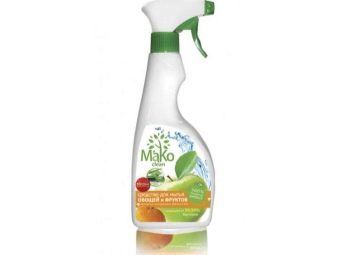
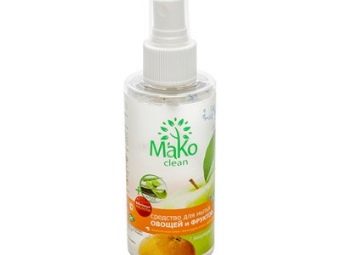
- Sodasan - This is a remedy from a well-known German brand. The product is great for washing vegetables and fruits. It is conveniently sprayed on the surface of the fruit and is very economically consumed. Perfectly removes wax, dirt and traces of various harmful chemicals. It is quite suitable even for washing berries. Contains in its composition only natural and safe substances.
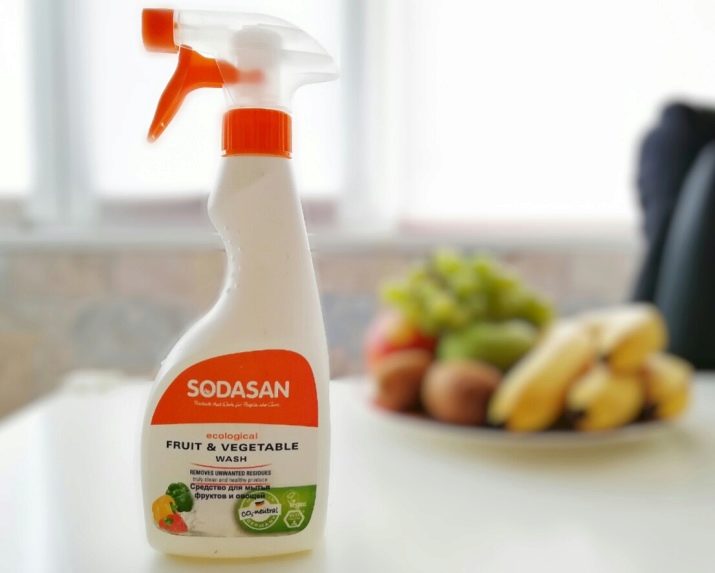
For information on how and why you need to wash vegetables and fruits, see below.

















